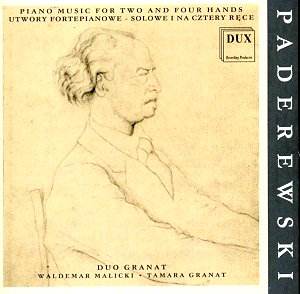There
is a little overlap here with Dux’s
own recording of the solo piano music
by Elżbieta Guzek, already reviewed
by me, and they include the
once ubiquitous Minuet in G, the Cracovienne
fantastique from the same Op. 14 set,
the Op. 8 Melodie and the Thème
Varié from Op. 16. Guzek offered
the big 35-minute Sonata, a Romantic
pile-driver of real interest. Here the
Duo Granat share the honours with Waldemar
Malicki taking most of the solo pieces
but with Tamara Granat taking on the
delightful Thème Varié
and opening with the Minuet. The
Duo then gives us the Tatra Album, six
miniatures of appealing freshness, directness
and folk-influenced, Brahms-absorbed,
joviality. A surfeit of Paderewski is
no bad thing in my book, even when his
salon or Chopin-reviving instincts do
take him perilously close to the generic.
His vein of nostalgia and delicacy however
proves rewarding and given his lyric
gifts coupled with an understated pathos
we have miniatures of real charm.
Granat’s
Minuet is straighter than her compatriot’s
and she doesn’t incinerate the bass
line so daemonically as does Elżbieta
Guzek, which is not necessarily a loss,
though her right hand filigree
runs are marginally less whimsical.
Waldemar Malicki doesn’t press the Cracovienne
fantastique too hard; it’s sufficiently
full of playful glint and colour as
it is and despite its salon limitations
it certainly takes some playing. The
Op. 6 Melodie is a particular example
of Paderewski’s homage to Chopin and
a most effective and persuasive one.
The Tatra Album was inspired by both
folklore and the Mountains that separate
Poland and Slovakia – a dual influence
that also haunts his fabled but as yet
unreleased-on-disc opera Manru.
Paderewski was closely involved in the
development of a TB sanatorium near
Zakopane, now a much visited holiday
location, and frequently supported developments
in the area and gave performances there
(and it was where he composed the Minuet
in G major and Cracovienne fantastique).
Of the six little movements the first
impresses with its dancing inflections,
the second with delightful simplicity
and the third, which begins with songlike
grace and also wistfulness then opens
out into frivolous humour. The Duo Granat
brings out the Brahmsian hints of the
Allegretto fifth movement and the off-note
rubato-laden dances of the final Allegro.
As before this release
has some good notes and booklet layout.
Dux has a strong commitment to Paderewski
and I welcome their care, enthusiasm
and professionalism.
Jonathan Woolf
